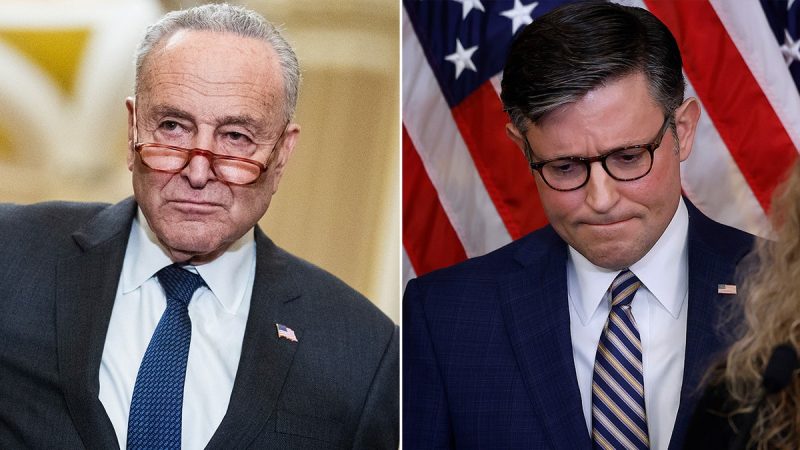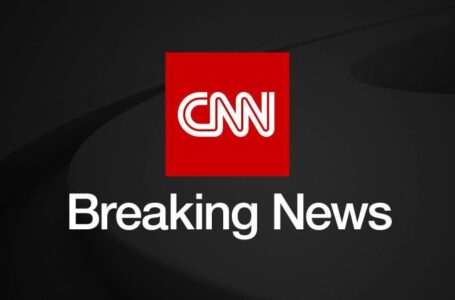Organizers say two sailors have died in Sydney to Hobart yacht race amid wild weather conditions
Schumer visits Ukraine, says he will ‘make clear’ to House Speaker Johnson ‘what is at stake’


Sen. Majority Leader Chuck Schumer, D-N.Y., and four of his Democrat colleagues arrived in Ukraine Friday morning to meet the country’s military leaders and President Volodomyr Zelenskyy, assuring U.S. support as billions of federal aid dollars remain in limbo.
Schumer’s visit to Ukraine — the country that will mark two years since Russia’s invasion on Saturday — comes amid mounting pressure on House Speaker Mike Johnson, R-La., to pass the Senate’s $95 billion foreign aid package that would deliver $60 billion in military assistance to help the Eastern European nation defeat Russian forces.
‘When we return from Ukraine: We will make clear to Speaker Johnson—and others in Congress who are obstructing military & economic support—exactly what is at stake here in Ukraine, for the rest of Europe, for the free world Congress must pass the Senate’s national security bill,’ Schumer said in a statement.
Schumer said the trip has four objectives: to demonstrate unwavering support for the Ukrainian people, reaffirm America’s commitment to NATO and European allies, to gain a comprehensive understanding of Ukraine’s armament needs and the potential consequences of failing to meet them, and lastly ‘we believe we are at an inflection point in history and we must make it clear to our friends and allies around the globe that the US does not back away from our responsibilities and allies.’
The four senators joining Schumer in Lviv are all Democrats: Sen. Richard Blumenthal of Connecticut, Senate Armed Services Chairman Jack Reed of Rhode Island; Sen. Maggie Hassan of New Hampshire, chairwoman of the Homeland Security Subcommittee on Emerging Threats, and Sen. Michael Bennet of Colorado, a member of the Senate Intelligence Committee.
In 2022, Sen. Minority Leader Mitch McConnell, R-Ky., led a delegation of Republicans to the Eastern European nation.
Republicans remain split on additional aid to Ukraine, and the package faces an uphill battle in the GOP-led House when they return from recess, as lawmakers are already paving the way for a backup plan. Zelenskyy has been urging the U.S. to continue its financial support to the war-torn nation for months.
Last week, the House unveiled a 30-page alternative proposal as Republican lawmakers shot down any chance of the Senate’s $95 billion aid package making it to the floor. Johnson and other Republicans have insisted that the southern border should be secured before approving additional Ukraine aid.
Both Democrats and many Republicans still argue that it is in the best interest for the U.S. to help Kyiv remain independent of Russian President Vladimir Putin and that helping defeat the authoritarian leader is critical to avoiding a wider, more intense conflict.
However, Republicans who have been critical of Ukraine argue the military funds lack proper oversight. Lawmakers point to a January Department of Defense (DOD) report, one of the most recent in a series of government watchdog publications highlighting deficiencies in overseeing U.S. aid to Ukraine, that outlines the inadequacies of both the Biden administration and the Ukrainian armed forces in effectively monitoring U.S.-supplied weapons.
The report from the inspector general specifically delves into enhanced end-use monitoring (EEUM), a classification reserved for weapons that ‘incorporate sensitive technology,’ are ‘particularly susceptible to diversion or misuse,’ or could have ‘serious consequences’ if diverted or misused.
According to the report, a substantial 59%, or $1.005 billion out of the total $1.699 billion value of EEUM-designated weapons sent to Ukraine, were classified as ‘delinquent.’ This means that they were not monitored in accordance with DOD standards.
Fox News’ Elizabeth Elkind contributed to this report.
Sen. Majority Leader Chuck Schumer, D-N.Y., and four of his Democrat colleagues arrived in Ukraine Friday morning to meet the country’s military leaders and President Volodomyr Zelenskyy, assuring U.S. support as billions of federal aid dollars remain in limbo.
Schumer’s visit to Ukraine — the country that will mark two years since Russia’s invasion on Saturday — comes amid mounting pressure on House Speaker Mike Johnson, R-La., to pass the Senate’s $95 billion foreign aid package that would deliver $60 billion in military assistance to help the Eastern European nation defeat Russian forces.
‘When we return from Ukraine: We will make clear to Speaker Johnson—and others in Congress who are obstructing military & economic support—exactly what is at stake here in Ukraine, for the rest of Europe, for the free world Congress must pass the Senate’s national security bill,’ Schumer said in a statement.
Schumer said the trip has four objectives: to demonstrate unwavering support for the Ukrainian people, reaffirm America’s commitment to NATO and European allies, to gain a comprehensive understanding of Ukraine’s armament needs and the potential consequences of failing to meet them, and lastly ‘we believe we are at an inflection point in history and we must make it clear to our friends and allies around the globe that the US does not back away from our responsibilities and allies.’
The four senators joining Schumer in Lviv are all Democrats: Sen. Richard Blumenthal of Connecticut, Senate Armed Services Chairman Jack Reed of Rhode Island; Sen. Maggie Hassan of New Hampshire, chairwoman of the Homeland Security Subcommittee on Emerging Threats, and Sen. Michael Bennet of Colorado, a member of the Senate Intelligence Committee.
In 2022, Sen. Minority Leader Mitch McConnell, R-Ky., led a delegation of Republicans to the Eastern European nation.
Republicans remain split on additional aid to Ukraine, and the package faces an uphill battle in the GOP-led House when they return from recess, as lawmakers are already paving the way for a backup plan. Zelenskyy has been urging the U.S. to continue its financial support to the war-torn nation for months.
Last week, the House unveiled a 30-page alternative proposal as Republican lawmakers shot down any chance of the Senate’s $95 billion aid package making it to the floor. Johnson and other Republicans have insisted that the southern border should be secured before approving additional Ukraine aid.
Both Democrats and many Republicans still argue that it is in the best interest for the U.S. to help Kyiv remain independent of Russian President Vladimir Putin and that helping defeat the authoritarian leader is critical to avoiding a wider, more intense conflict.
However, Republicans who have been critical of Ukraine argue the military funds lack proper oversight. Lawmakers point to a January Department of Defense (DOD) report, one of the most recent in a series of government watchdog publications highlighting deficiencies in overseeing U.S. aid to Ukraine, that outlines the inadequacies of both the Biden administration and the Ukrainian armed forces in effectively monitoring U.S.-supplied weapons.
The report from the inspector general specifically delves into enhanced end-use monitoring (EEUM), a classification reserved for weapons that ‘incorporate sensitive technology,’ are ‘particularly susceptible to diversion or misuse,’ or could have ‘serious consequences’ if diverted or misused.
According to the report, a substantial 59%, or $1.005 billion out of the total $1.699 billion value of EEUM-designated weapons sent to Ukraine, were classified as ‘delinquent.’ This means that they were not monitored in accordance with DOD standards.
Fox News’ Elizabeth Elkind contributed to this report.











